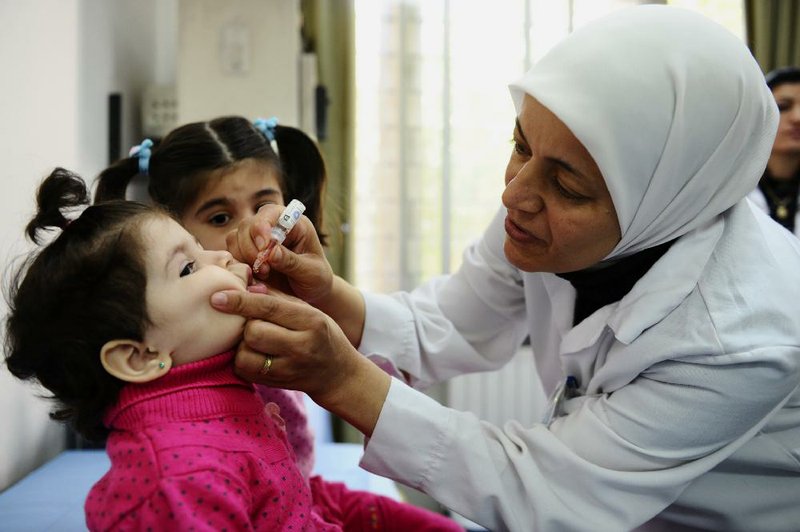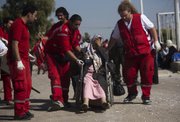DAMASCUS, Syria - Syria’s president fired a deputy prime minister who met Western officials to discuss the possibility of holding a peace conference, saying the official acted without permission. The Tuesday decree was the latest blow to diplomatic efforts to get the country’s warring parties to the negotiating table.
Meanwhile, the United Nations health agency said it confirmed 10 polio cases in northeast Syria - the first confirmed outbreak of the highly contagious disease in that country in 14 years. Officials warned that the disease threatened to spread among an estimated half-million children who have never received polio immunizations because of the 2 ½-year civil war.
Deputy Prime Minister Qadri Jamil was fired after a weekend meeting in Geneva that Washington says was with its ambassador to Syria, Robert Ford.
The meeting Saturday was to discuss the possibility of holding a conference next month, also in Geneva, to negotiate a settlement in Syria’s conflict, said a U.S. official who spoke anonymously because he was not authorized to discuss the private conversation.
Three days later, President Bashar Assad issued a decree relieving Jamil of his duties “because of his absence from office without prior permission and not performing his duties,” Syria’s government news agency SANA said.
The official media outlet also cited Jamil’s “involvement in activities and meetings abroad without coordination with the government and overstepping” his authority.
Jamil told Lebanon-based Al-Mayadeen TV that he also met with a Russian diplomat and U.N. officials. He did not say whether his moves were coordinated with Assad.
“I am not an employee,” he said. “I am a political activist.”
Jamil, a Russian-trained economist, was one of several opposition figures whom Assad appointed to office last year. Jamil was a member of People’s Will, the formal name of Syria’s communist party.
In various interviews, Jamil said he opposed armed rebellion and argued that peaceful change from within Syria was the only solution to the nation’s crisis.
Syria’s civil war, which began in March 2011, has cost more than 100,000 lives, according to United Nations figures. It is unclear whether U.S.-Russian efforts to sponsor peace talks next month in Geneva will result in formal negotiations involving opposition and government representatives.
In other diplomatic efforts aimed at persuading warring parties to attend the conference, the U.N.-Arab League envoy to Syria, Lakhdar Brahimi, is in Syria to meet officials and opposition figures.
Assad has said in principle that his government will attend talks, but it will not negotiate with the country’s disparate armed rebel groups. Much of Syria’s opposition rejects any transition plan in which Assad or his close associates are involved.
Meanwhile, a U.N. official warned that cases of polio confirmed in Syria could spread across the war-battered country because of a lack of access to clean water, sewage infrastructure and a lack of vaccinations.
World Health Organization spokesman Oliver Rosenbauer said 10 cases were confirmed among babies and toddlers, all under age 2. Rosenbauer said the organization was awaiting laboratory results on another 12 cases showing polio symptoms.
The polio virus usually infects children in unsanitary conditions through consuming food or drink that has been contaminated with feces. It attacks the nerves and can kill or paralyze and can spread widely and unnoticed until it starts crippling children. The disease paralyzed U.S. President Franklin D.Roosevelt.
“This is a communicable disease - with population movements it can travel to other areas,” said Rosenbauer. “So the risk is high of spread across the region.”
Neighboring Lebanon and Jordan are likely to be at particular risk because the two countries have absorbed the bulk of Syrian refugees fleeing war-torn areas.
More than 4,000 Syrians surge daily into neighboring countries to flee the civil war, according to the U.N. refugee agency. The poorest refugees often crowd, several families together, into apartments and dilapidated shacks.
The outbreak in Syria adds to recent discoveries of the polio virus in Israeli sewage systems, setting back the World Health Organization’s $5.5 billion initiative to make the world polio-free by 2018. While global cases of polio dropped to 223 in 2012 from 350,000 in 1988, they rose this year to 301, according to the United Nations agency’s data.
After confirming the presence of the disease, attention is turning to identifying the source, Rosenbauer said. Public health officials have speculated that a source may have been jihadists traveling to Syria from Pakistan, which is one of three countries, with Afghanistan and Nigeria, where the disease is still endemic.
Anthony Lake, executive director of the United Nations Children’s Fund, said his organization and the World Health Organization planned to immunize 2.4 million children throughout Syria. More than 500,000 have never been vaccinated against the disease.
There’s no cure for polio, and it can be prevented only through immunization.
Lake said he had discussed issues concerning access to war zones with senior Syrian officials. He said they had not begun negotiating with rebels.
“Vaccinations and immunizations have absolutely no political content, they have no relationship to any military issues and therefore there is every reason … [to] believe we will gain access into these communities,” he said.
“Anytime you have half a million or more children who have not been reached with lifesaving vaccinations, then it is very urgent that you be able to get in to vaccinate them,” he added.
Syria said it had launched a vaccination campaign around the country days after the Geneva-based World Health Organization said it had received reports of children showing symptoms of polio in Syria’s Deir el-Zour province, but the campaign faces difficulty with lack of access.
About 95 percent of Syrian children were vaccinated against the disease before the civil war began more than 2 ½ years ago. Polio was last reported in Syria in 1999.
But Syria’s civil war has caused medical and other government services in many areas to collapse, particularly in rebel-held territory. Armed clashes and government blockades prevent medical workers and supplies from reaching many rebel-held towns, activists said.
One blockaded rebel enclave is the besieged western Damascus suburb of Moadamiyeh, where activists reported last week that residents were eating boiled grape leaves and raw olives because they had run out of food.
Activists had reported in September that six people there died of illnesses related to malnutrition.
On Tuesday, rebels and Syrian forces observed a cease-fire to allow nearly 2,000 residents to flee the neighborhood. Some elderly and ill residents were carried by Red Crescent workers. Young men were rounded up by government forces and taken away.
About 3,000 residents of the suburb also had been able to flee the area in late August during a cease-fire.
“We received calls from inside Moadamiyeh and from the people who are outside the place that they would prefer to go out because it’s not only a matter of eating, but also a matter of security,” said Agnes Mariam, a pro-Assad nun who negotiated the evacuation.
Information for this article was contributed by Albert Aji, Dusan Stojanovic, Darko Bandic, John Heilpri, Matthew Lee, Bassem Mroue and Diaa Hadid of The Associated Press; by Patrick J. Mc-Donnellof the Los Angeles Times; by Nick Cumming-Bruce of The New York Times; and by Sangwon Yoon of Bloomberg News.
Front Section, Pages 1 on 10/30/2013


